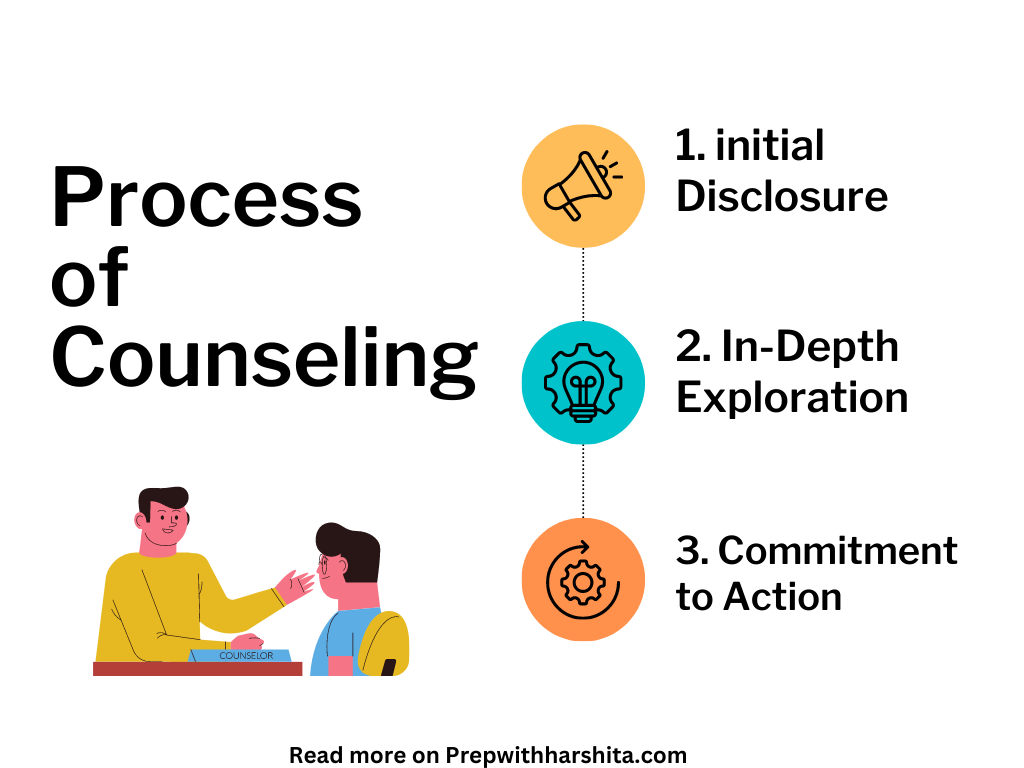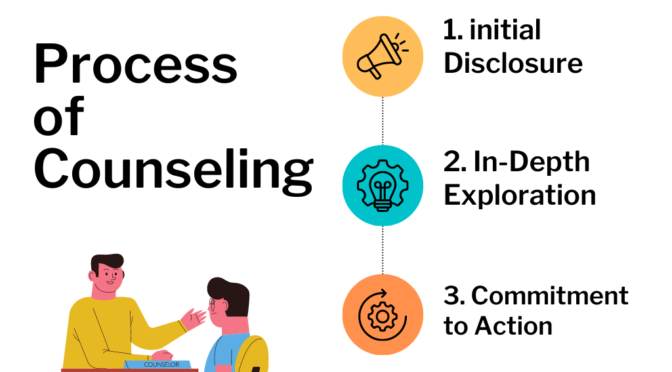The process of counselling typically involves three main stages: initial disclosure, in-depth exploration, and commitment to action.
Let’s explore each stage in detail:
- Initial Disclosure: During this stage, the counselor and client establish a rapport and create a safe and comfortable environment for open communication. The counselor explains the purpose, goals, and confidentiality of the counseling process, ensuring that the client understands the nature of the counseling relationship.
The counselor encourages the client to share their concerns, issues, and experiences. The client is given the opportunity to disclose their thoughts, emotions, and any relevant information that led them to seek counseling. The counselor actively listens, demonstrates empathy, and may ask clarifying questions to gain a deeper understanding of the client’s situation.
The initial disclosure stage is crucial for building trust, establishing a therapeutic alliance, and setting the foundation for further exploration.
- In-Depth Exploration: Once the initial disclosure is made, the counselor proceeds with a more detailed exploration of the client’s concerns. This stage involves an in-depth assessment of the client’s thoughts, emotions, behaviors, and any underlying factors that contribute to their current difficulties.
The counselor uses various therapeutic techniques, such as open-ended questions, reflection, summarizing, and probing, to facilitate a deeper exploration of the client’s experiences. They may also employ specific counseling approaches or interventions tailored to the client’s needs and the counselor’s theoretical orientation.
During the in-depth exploration, the counselor and client work collaboratively to identify patterns, triggers, and underlying issues that may be contributing to the client’s challenges. The counselor helps the client gain insight into their emotions, thoughts, and behaviors, encouraging self-reflection and self-awareness.
- Commitment to Action: In this final stage, the counselor and client collaborate to develop an action plan for positive change and growth. Based on the insights gained during the in-depth exploration, the counselor helps the client identify specific goals and objectives to work towards.
The counselor may provide guidance, psychoeducation, and skills training to empower the client in making meaningful changes. They might also suggest various strategies, techniques, or resources that can assist the client in achieving their goals.
The commitment to action stage involves regular monitoring and evaluation of the client’s progress. The counselor and client review and adjust the action plan as needed, ensuring that it remains relevant and effective. The client is encouraged to take responsibility for their growth, applying the insights gained in counseling to their daily life.
Throughout the counseling process, the counselor maintains a supportive and non-judgmental stance, providing validation, empathy, and encouragement. They foster a therapeutic environment that promotes personal growth, self-acceptance, and improved well-being.
It’s important to note that the counseling process is highly individualized and can vary based on the counselor’s theoretical orientation, the client’s needs, and the specific goals of counseling. The stages outlined above provide a general framework, but the actual process may be adapted to fit the unique circumstances of each client.
Also Visit: Prep with Harshita

Also Read: Factors Affecting Mental Health


I needed to put you the little bit of note to thank you very much once again for these pretty basics you’ve discussed on this site. It was quite unbelievably open-handed of people like you to give easily just what many of us might have made available as an electronic book to help make some money on their own, and in particular now that you could have tried it in the event you considered necessary. The advice as well worked to provide a good way to be certain that some people have the same fervor similar to mine to find out a whole lot more in respect of this problem. I believe there are thousands of more fun opportunities up front for individuals that look into your site.
Espectro de vibracion
Sistemas de calibración: importante para el operación uniforme y efectivo de las máquinas.
En el entorno de la tecnología moderna, donde la rendimiento y la estabilidad del dispositivo son de alta significancia, los aparatos de ajuste desempeñan un papel crucial. Estos sistemas especializados están diseñados para balancear y asegurar componentes dinámicas, ya sea en dispositivos productiva, transportes de traslado o incluso en aparatos hogareños.
Para los especialistas en conservación de aparatos y los técnicos, trabajar con dispositivos de ajuste es esencial para garantizar el funcionamiento suave y seguro de cualquier mecanismo móvil. Gracias a estas herramientas avanzadas sofisticadas, es posible reducir significativamente las oscilaciones, el zumbido y la esfuerzo sobre los soportes, extendiendo la duración de partes valiosos.
Igualmente significativo es el función que juegan los dispositivos de ajuste en la asistencia al usuario. El asistencia profesional y el soporte constante empleando estos aparatos habilitan ofrecer servicios de gran excelencia, aumentando la satisfacción de los clientes.
Para los titulares de negocios, la inversión en sistemas de balanceo y detectores puede ser esencial para mejorar la productividad y eficiencia de sus dispositivos. Esto es sobre todo significativo para los empresarios que administran reducidas y intermedias organizaciones, donde cada aspecto es relevante.
Asimismo, los sistemas de calibración tienen una gran utilización en el campo de la protección y el control de calidad. Permiten localizar potenciales fallos, impidiendo intervenciones costosas y averías a los aparatos. Más aún, los resultados obtenidos de estos sistemas pueden usarse para optimizar procesos y potenciar la visibilidad en plataformas de consulta.
Las campos de implementación de los dispositivos de balanceo cubren numerosas industrias, desde la manufactura de ciclos hasta el control del medio ambiente. No interesa si se considera de extensas producciones productivas o limitados locales hogareños, los aparatos de balanceo son necesarios para promover un operación efectivo y sin detenciones.